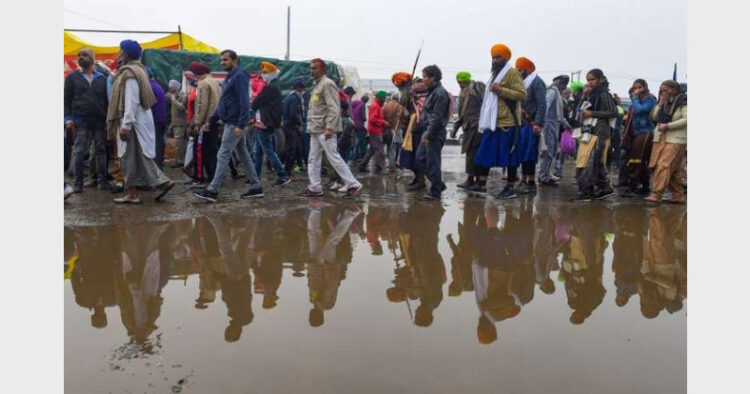On January 26, 2021, agriculturists and 'middlemen' of Mandis were on the warpath against three contentious farm laws. Now, all that is over. The farm reform has taken a beating. But politics goes on.
New Delhi: One of the longest protests by the agricultural community had begun on November 25-26, 2020—when the COVID-19 protocols and concerns still prevailed.
Thousands of farmers, mainly from Punjab and Haryana, India's two-agri rich states, marched towards Delhi. On January 26, 2021, the violent march forced people to raise eyebrows and several questions.
Even there was an attempt for a siege on the Red Fort, and creditably, the Delhi police and other security personnel only showed a restraint.
The protesting farmers laid siege to New Delhi almost in a violent show of strength. The mayhem killed a farmer and injured more than 100 police personnel. A tractor rally on Republic Day had deviated and derailed from permitted routes. All these are now over.
The farmers have won a battle and would now get ready for the war – or the bigger and real war — wherein hundreds of them would have to ensure that their respective families can sustain and run.
Protesting farmers at Singhu – not far from India's national capital – had started to pack up their trolleys and bags. The outcome was known as on November 19, Prime Minister Narendra Modi had announced the withdrawal of the three contentious farm laws.
Subsequently, a Repeal Bill was carried through in Parliament during the Winter Session.
"Good politics has harmed farmers and horticulturists, especially in hill states that do not have a Mandi system of post-production operations," says B. Tuton Kumar, a social activist and Modi-admirer in Tripura.
He says: "The repeal of three contentious farm laws signals a big cost to the country that required farm reforms."
Alas, it was a victory for a section of farmers or the 'rich farmers' in some parts of UP, Punjab, and Haryana.
The three laws were PM Narendra Modi's 'dream projects'. The 3-legislation package sought to open the sector to small and marginal farmers so that they could sell their products outside government-controlled markets. Now, all that is stalled.
Samyukt Kisan Morcha (SKM) leader Balbir Singh Rajewal said on December 9, "The Andolan has been suspended. The Unions will meet again on January 15, 2022. Then we will review and ensure whether the government has kept its promises and agreed to our proposals sincerely."
Formal communication from the Ministry of Agriculture and Farmers Welfare and a "signed letter" was placed before the farm unions, and finally, the decision has been made to suspend the stir.
The farmers would now go back home. The 'farmers' supported by opposition parties and 'middlemen' in Mandis were demanding a complete repeal of three contentious laws – — the Farmers' Produce Trade and Commerce (Promotion and Facilitation) Act, 2020; Essential Commodities (Amendment) Act, 2020; and Farmers (Empowerment and Protection) Agreement on Price Assurance and Farm Services Act, 2020.
When PM announced the withdrawal of the farm laws, Chandigarh's best known English newspaper, 'The Tribune', said in an edit-"… There is no room for intransigence anymore. Our agriculture can be future-ready only if the spirit of cooperation and collaboration prevails over discord and discontent."
It also said – "For now, the wisest course for the farmers would be to end the agitation and return to their fields. Though agriculture was easily the most resilient sector during the Covid pandemic, Indian farming finds itself at the crossroads….."
How true?














Comments